Interview with James Harvey, September 1978
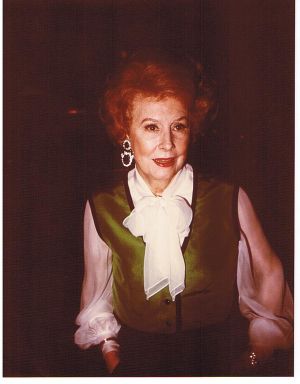
I turn the tape recorder on, and we both look at it.
ID: ...Don't you have to take it out of its package?
JH: No, that's for carrying it.
ID: That shows how much I know about it. -- Is it on now?
JH: It's on now.
ID: Oh...(laughs) Well, we won't talk about him then...Although I did know Ernst Lubitsch.
JH: You did?
ID: Well, I didn't know him well -- but he lived up here right next to Merv LeRoy. I always remember the cigar...And he did some brilliant things. I thought -- just lovely.
JH: Have you seen The Awful Truth lately?
ID: No, I haven't.
JH: Is that one of the prints you own? You said you had prints of some of your films.
ID: I know I did. I have to stop and think...whether I own that. I never run them. I wonder...if they detoriate. They would detoriate whether I run them or not, I suppose...No, I haven't seen The Awful Truth, but I'll always enjoy it.
JH: When you say you improvised on that film...
ID: Well, Leo wrote an awful lot of it. While we sat on the set and waited.
JH: Did you or Grant ever supply dialogue?
ID: Oh no, never. I don't think we ever supplied any dialogue. But McCarey was very good about sitting down and wanting to talk things out...The scene, if you remember, where she plays the part of the nightclub dancer who is supposed to be Cary's sister...that was really all written right on the set...Do you know what the bumps are? You do? -- Well, I could never done them in the way they were supposed to be done. I think she must have done them in the original scene and now I was trying to imitate her. And this was so typical of McCarey -- we came to that part, and I tried...and I said, "I never could do that" -- and he just left it in the film like that...No, the only writing I did, as I told you, was my own -- when I went back to my dressing room.
JH: To write thoughts about your character?
ID: Yes, I'd write and write and write -- isn't that strange? If anybody had read it ever, they would have wondered about my sanity, because I would just ramble on, just to have thoughts of my own...I suppose other people do that, but I've never discussed it with anybody.
JH: Did McCarey ever talk about the character with you? About her motivation?
ID: Not really. He'd give you the scene and see what happened. And of course he was a great man for routines. Like that part when she had that long chiffon handkerchief, and this grande dame who was sitting next to her thought she was sitting on the handkerchief -- and then she was sitting on the handkerchief -- and this went on and on like a regular comic routine. But that was Leo's early training -- this was his background.
JH: Did you have many takes on that film?
ID: No. This was a director who loved spontaneity above everything. No, I don't remember many takes at all. The only one, as I mentioned to you earlier, was Mr. John Stahl -- he was the one who wanted take after take after take.
JH: McCarey would do it in one take?
ID: Sometimes. Yes, sometimes. But then we'd sit and wait. It was a lot of fun, but my goodness, we used up an awful lot of time.
JH: Was Love Affair the same sort of experience? Did you do any improvising?
ID: I'm sure we did lots of it. Yes, lots of it.
JH: The serious scenes as well? It wasn't just comedy McCarey took this approach to?
ID: As I say, he kept handing us pieces of paper all the time with new dialogue. So there wasn't much sense in learning anything -- you only had to unlearn it. It was a different way of working -- I'm sure it could never happen today.
JH: How did you prepare?
ID: Well, as I said, with this particular director I couldn't prepare much beforehand. I had to stop off all the time and prepare as I was shooting. Which kept you on your toes, all right... But ordinarly, if you had a full script you could prepare thoroughly. And you had to. Well...most thinking actresses -- as they say, if an actress is falling down the steps, she's analyzing it -- how she feels when she's falling down the steps. I don't know...that's going a little far, perhaps...
JH: Love Affair falls into two parts, it seems -- the first half is sophisticated comedy, the second is sentimental. Do you have any idea how or why that happened?
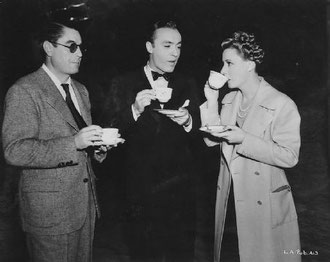
ID:I do remember one thing. You know yourself if you've ever been on a trip, a cruise for instance, and then you land back home, there's a terrible letdown. That's what happened to us in the filming. Everything on board ship was amusing and fun -- they fall in love and this, that, and the other. Then when they arrived home it was a terrific letdown. I remember that Loe called in two or three writers immediately. He said, "You know we are sinking right here in the middle of this film."
JH: Did he have a script for the second part of the film?
ID: I imagine so, but it wasn't working. However, I know I never saw a finished script of Love Affair before I did the movie.
JH: McCarey was a sentimental man?
ID: Oh, yes. He was an Irish sentimentalist. As you saw in -- what did he do?...Going My Way. (She makes a face. I laugh.)...he was a delightful man to work with.
JH: You were good friends?
ID: Yes, we were good friends, but we really didn't see much of him. He lived at the beach, he and his wife, and he had one daughter. They weren't social at all.
JH: He had a drinking problem, didn't he?
ID: Yes, but never on the film.
JH: Was he much on the set when you did My Favorite Wife?
ID: No, he was hurt then, he'd had this accident. He was never meant to direct that, you know. He was to produce it and Gar Kanin was to direct it, just as they both did...You didn't particularly like that film?
JH: No. But you like it?
ID: I thought it was...kind of amusing. I love the bit players in it. The little fellow who comes to sell insurance was marvelous. I thought...it was fun.
JH: But you didn't want to do Theodora Goes Wild?
ID: That film...was the biggest surprise of my life. I still don't see how it was so successful. They showed it about a year and a half ago -- something to do with the Screen Actors Guild, and would I make and appearance later? I went in and here were all these young people -- and they were really quite respectful of the whole thing. You remember, she moves into this fellow's apartment and the minute she moves in, he moves out -- because that was the Hays Code. I thought, these kids are just going to laugh that off the screen. They didn't ...funnily enough.
JH: When I show it to students, they love it.
ID: They do? It seemed to me very... well, unsophisticated.
JH: Why were you so very reluctant to do it? You stayed in Europe three months to avoid coming back and doing it?
ID: I stayed there two. Well, I'd never done a comedy before. I'd done serious parts like Back Street -- and here was this little flipperty small-town dummy, and I just didn't want to play her at all. But I got back here and there she was waiting for me... You know, none of us wanted to do that picture. The director -- Boleslawski -- was being penalized for something. I was threatened with suspension if I didn't do it, so my nose was out of the joint. We all got together like a bunch of rejects. But then the front office loved everything so much that it became a happy film. We had no problems. I enjoyed working with Melvyn Douglas, and everything rolled along beautifully.
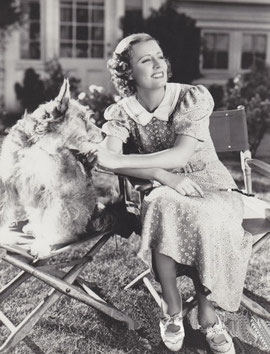
JH: What was Boleslawski like to work with?
ID: Very kind. He too was not in good health. Neither was Victor Fleming when I worked with him. I'm surprised they both made films as good as they were.
JH: How did that affect Theodora -- Boleslawski's poor health?
ID: Well, evidently it didn't affect it much. But her never struck me as a man with any flair for comedy... Douglas was very good -- and I guess the story... was kind of cute. I know lots of friends of mine like it better than almost anything I ever made. Because they say, now that's the real you... Well, I don´t know what that means. (pause; then in a small voice) She's supposed to gone wild, but she didn't go very wild really...
JH: No. By the way, is it true you were offered His Girl Friday and turned it down?
ID: No. My pal did that. Rosalind Russell. (pause) I suppose the film I thought was most difficult was A Guy Named Joe. It was winter, it was dark and raining and the whole set was gloomy. Then Van Johnson had this terrible motorcylce accident, so we discontinued shooting. And when we started again, I had to jump back and forth between that and the The White Cliffs Of Dover. Spencer Tracy didn't like to rehearse, and he was sort of calling the shots on that picture. I don't particularly like to rehearse a lot, but I don't like not to rehearsing at all.
JH: You had trouble with Tracy?
ID: We had trouble understanding each other. We really did. He was my hero. Then when we started working he got the idea that I thought he wasn't a hero anymore. Which was not true. But he had this big mental thing, and there was even talk of taking me off the film. That's one thing I'll always say about L. B. Mayer... I knew they were going to be looking at some film -- and I made up my mind I was going to be... my best... my best, my best, my very best... So they came out of the projection room and Mayer said, "If we are going to replace anybody, let's replace Tracy." Which they never would have done, of course. But I'll always remember that. And we ironed everything out, Tracy and I.
JH: You did?
ID: Oh, sure. We became very good friends.
JH: What was the nature of -- ?
ID: Just what I said. He felt I didn't regard him -- that my hero had feet of clay... and that really wasn't true.
JH: Did you watch other movies in those days? Did you learn from watching them ever?
ID: No. I just took my characters as they came and tried to be that character. I had a one-track mind when I was working. I excluded everything else. I had no social life. I just lived that particular part. It wasn't a job. I just was that character. I used to drive my husband and my family crazy because I'd talk about "her" all the time -- she did this and she did that. They'd say, "Are you talking about yourself now?"
JH: Were you ever troubled by a character you had to be? Did you ever play a character you didn't like?
ID: Well, I didn't like the one in Life With Father. I thought she was really unbelievable rattle-brained... but the critics liked it. They loved the picture. They loved the New York stage show, as you know.
JH: Where there any actresses you watched in those days, any you particularly admired?
ID: I always admire Lynn Fontanne, on the stage. I liked Katharine Hephurn, on the screen -- though of course I would never try to emulate her. I love Garbo, because she was so romantic... I admired Bette Davis; she was such a vital actress. But as far as studying...
JH: Did you watch Lombard, Jean Arthur, and the other comediennes?
ID: I didn't admire them.
JH: You didn't?
ID: No. Not really.
JH: Why not?
ID: I don't know... I never admired a comedienne. I never wanted to do comedy, and yet it was very easy for me. Very natural. It was no effort for me to do comedy at all. Maybe that's why I wasn't so appreciative of it. I liked the heavier things. I liked doing the woman in Magnificent Obsession. And as I told you, I liked playing Mama in I Remember Mama.
JH: Do you think you learned from Lynn Fontane, from watching her?
ID: Well, I admired her so much. I loved her delivery. I liked the way she and Alfred Lunt played together -- all that dovetailing and overlapping of lines. They must have rehearsed and rehearsed at home together -- because that's the way we talk in real life. And I liked the way she carried herself -- even up to her very end. I saw one of her last plays -- I've forgotten the name, but she was quite elderly. So she wore these high collars, and everyone thought, well, of course... Then in the last act she came out in a décolleté down to here... looking just divine, you know -- and all those old hens in the audience were going: look, look, look... Sensational...
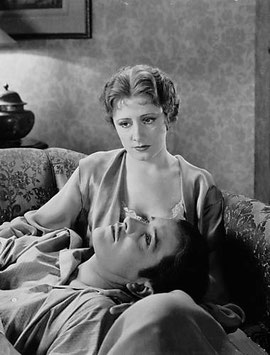
JH: You and Grant have something like the Lunt's rapport together.
ID: I think so. Yes, I think so. (laughs) Cary was quite a mumbler.
JH: Was he?
ID: He'd go mmm-mmm-mmm -- he'd throw in little yeses and nos and mumbles all the way through... He was a lot of fun to work with. He was a lot of fun between scenes as well -- and I was probably the best audience. I used to die laughing at him, and of course the more I laughed the more he went on. He does a cockney thing that is too funny for words. I'd always get him started on something like that...
JH: In Mama there seems to be such identification between you and the character that it doesn't seem to be acting at all. When that happens do you know it's happening?
ID: No -- because you're out of sequence all the time. Actually, it's remarkable -- you don't know whether you're giving a performance or not half the time. (In) that particular film all the exteriors were shot in San Francisco. So you go up and shoot the beginning and shoot the end, then a little something in the middle -- and you just hope you've gotten a handle on the whole thing. But I don't think anybody's quite sure.
JH: You played a lot of tearjerkers early on. Did you ever feel oppressed by the senitmentality of those scripts? Especially since you got so close to the characters.
ID: You know, in a film like Back Street, that was so curious. I cannot tell you the mail I got on that film -- from women who said it was their story... No, I don't think so. I've heard and I've read about people who play a part where they are mentally deranged... or some of those rape scenes or something like that. I should imagine that would keep you awake the night before. (I laugh) You know? ... But I never had anything quite that drastic. The closest I came, I suppose, was the blind woman in Magnificent Obsession.
JH: One of the problems with the Back Street kind of heroine, I should think, is that she is constantly sacrificing herself. How do you avoid to give her a conscious nobility, a self-congratulating quality?
ID: I understand that in one of the remakes she was a very successful decorator. But that's all wrong. This woman was a pathetic character. She loved this man so much that she could never have her independence. And you can say, well that's so soapy, so unrealistic -- but it was that woman. She used to sit in her little apartment and do -- in those days -- painted china. You know, I still have some painted china my mother did... No -- she just had to be... a very, very alone woman. That was the whole idea. And he was a very selfish man.
JH: She was never self-pitiying, in your idea of her?
ID: I don't think so. I hope I wasn't.
JH: No, no.
ID: She accepted it...
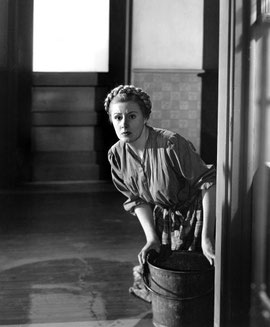
When the first side of the tape ran out, I played a bit of it back to make sure we'd recorded something. "I always sound like I'm in bed" was Dunne's comment upon hearing herself. I turned the tape over and we went on.
ID: ... We've been listening to this tape and I've found that I'm much too relaxed. So I'm getting to sit up straight... You know, when I did The Mudlark I had to speak, of course, in this very clipped English accent. I was born in the South. I don't have a southern accent, but I do drawl at times... and I find when I'm sitting back like that, in a very lazy mood... and we're sitting out here on the patio... and it's a beautiful day... and I drawl... So that clipped accent was very difficult for me. Especially the word "courage" -- the English have a very distinct way of saying that, and I still can't say it... Courage.
JH: Lucille Ball gave an interview at an AFI seminar here and said that you were the actress at RKO she most liked to watch -- that each take you did would be different and wonderful.
ID: Did she? Well, that's very sweet, coming from, I think the top comedienne of all time.
JH: Really?
ID: Yes. Because, well, comedy is timing mostly -- and Lucille has always had perfect timing.
JH: You think so?
ID: Oh, I do think so. She's been a great clown.
JH: Your timing is pretty good.
ID: Well... Cary Grant always said that I had the best timing of anybody he ever worked with. But that's unconscious. I think -- comedy timing. Nobody can give you that -- you just have it or not.
JH: According to Lucille Ball, you used to vary what you did when you did a lot of takes.
ID: Oh, really?
JH: Do you think that was true?
ID: Well, I suppose... the director was looking for me to improve... each time. Maybe that was it. Anyway, I don't think you can ever be completely identical, especially if you're working with a lot of props and other people.
JH: Do you remember if Tay Garnett did a lot of takes on Joy of Living?
ID: I don't remember anything about that picture... I remember that Douglas Fairbanks -- funny the things you do remember -- that Douglas had been in England and was a quite an Anglophile. There was a scene where he wanted to say "fu-tile" -- and Tay Garnett said, this is an American picture, and you are going to say "fewtle" if we have to stay here all day. And we nearly did.
JH: Douglas Fairbanks said in an interview that you were terrific to work with.
ID: He did? Well , we had a lot of fun on that picture. I don't remember the story very well because I haven't seen it. I've seen the different ones we've talked about, like Love Affair and The Awful Truth and White Cliffs Of Dover. I have seen them through the years, but I haven't seen Joy Of Living and I've forgotten it.
JH: It's a fine performance.
ID: She was an actress, I believe?
JH: Yes... Which directors gave you a lot of interpretation of the characters?
ID: Those were the directors I didn't like. I wanted to do my own thing. I they didn't like it, then we would do something about it, but as it turned out most times they seemed to like what I was doing and most times they would leave it at that. George Stevens was specially good that way -- at letting you try your own wings.
JH: Which directors discussed motivations with you a lot?
ID: Well -- I think Michael Curtiz, for instance -- in Life With Father, because I didn't like the role very much, and he had to placate me and make it more palatable. But not many of them would sit down... Rouben Mamoulian kind of liked to tell you how it was to be done -- until we got together and he sort of let me have my head. No, most of the directors -- the really fine directors -- want to see what you will give them first. The worst kind is the frustrated actor director -- the kind who gets up and shows you all the moves, who wants to show you how it should be done before you even have a chance -- instead of letting you try it first and then working it out together. That kind of director I couldn't work with at all. (pause) Only one argument I remember having with George Stevens -- and as I look back it, he was a man of very, very few words. It was on Mama. He said, "I want you to come in the door and walk here, about ten steps, and then I want you to cross the room." I said, "Why?" He said, "Do as I say -- ten steps, then cross." Well, I didn't like that; I have to know why I'm doing something. As it turned out, it was just for the cutting. But he wanted to be stubborn, to make me do it without telling me why. So we had a kind of upset.
JH: Stevens was slow. What took the time?
ID: He was a perfectionist. A perfectionist... he took a lot of preparation with his crew. He didn't do a lot of takes.
JH: John Stahl was slow, too?
ID: Stahl... was rough on his actors -- I mean, on his extras and bit players. He and Charles Vidor. They treated the stars beautifully, but they were awfully hard on the bit players. That was upsetting... Stahl would throw things around on the set... At that time I didn't think that was funny. (pause) Even I was cured of a temper one time. I got so angry I threw a hairbrush, and I hit a standing mirror and this wardrobe girl was right there. I could have blinded her; it could have done awful things to this girl. As it happened, it didn't. But from that I said, never again. No more losing temper, never, never, never again... will I lose my temper on a set again...
JH: That was on a Stahl film?
ID: It was on a Stahl film. (She laughs) It was on Back Street. (laughs again) In those days I used to knit. Everybody else smoked, and they would take a cigarette, and I didn't smoke so I'd grab my knitting. I'd sit there very placidly. Finally John Stahl said, "You have to put that knitting away! You are driving me crazy!" (laughs) I looked to complacent to suit him. He wanted me bothered... You know, I hadn't been in the business very long then, and Stahl never allowed us to see the rushes. I remember that he had this secretary named Bernice, a lovely woman -- and he never moved without Bernice. She would go to the rushes and then they would huddle... you know? You never knew what they were talking about. That used to upset me.
JH: Who was the leading man you felt the greatest professional excitement with?
ID: Well, I think the two would be of course Boyer and Grant -- I would think. I would have felt... they were so attractive in themselves -- I mean, I liked them. Even if I were not in a movie with them, I'd enjoy seeing them. -- Yes, definitely those two.
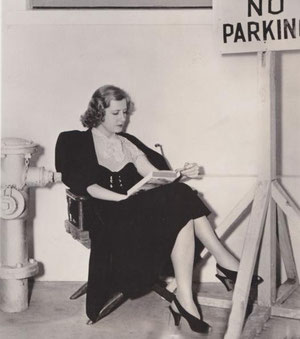
JH: But you didn't enjoy making When Tomorrow Comes, the Stahl film with Boyer?
ID: No, I didn't. It's quite a nice way I have, isn't it, of blocking out things I don't like to remember? ... I only remember one scene in that film... we were caught in a storm -- in a church choir?
JH: Yes. It's a strange scene.
ID: And he was a pianist -- or I was?
JH: He was. (I laugh)
ID: Yes, I remember him sitting at the piano ... And was I a waitress?
JH: Yes, you were a waitress.
ID: I remember those early scenes, yes.
JH: You were very good in them, too. (She looks at me dryly. I laugh)
ID: (softly) I can't imagine that I was good in that.
JH: Really? Why not?
ID: Well... I don't know. I didn't like it.
JH: And even working with Boyer didn't help?
ID: Not in that.
JH: Did he dislike it, too?
ID: I don't think he liked it very much... But he did say before he died, he told someone that his favorite film was Love Affair... And he did a lot of films. (She laughs.) The last time I saw Love Affair I said to him, "You know, Charles, you really were good." "Ah," he said, "so you finally looked at me."
JH: You know... you have this extraordinary ability on screen -- like no one else -- to suggest craziness, breaking loose...
ID: You think so?
JH: I do.
ID: I never thought so. I didn't think I ever broke loose. I always felt I could have had more abandon.
JH: An example is that wonderful moment in Show Boat when Hattie McDaniel sings "Can't Help Loving Dat Man" and you break into that wild shuffling and trucking step.
ID: Well... that routine was always in Show Boat... the way she emulates the blacks... That's another one you liked that I didn't particularly like -- Show Boat. I loved the show, but I didn´t think that it adapted to the screen well.
JH: One thing that's clear about people who become stars, especially in the days when you were a star, was that they had a certain sort of suitability for the camera -- something quite different from stage presence. Don't you agree?
ID: (smiling) That reminds me about a joke they tell about... Marlene Dietrich I think. She was doing a film with Charles Boyer -- or maybe it was Ronald Colman. Anyway, the story goes... that she said to him, "Do you have a good side?" And he said, "Well, I don't know... but" -- he said -- "they tell me... my right side is better than my left." (I am laughing.) You know the story?
JH: No, no.
ID: And so he said, "What about you?" And she said, "Neither of my sides are good... I have to look straight into the camera... " (I laugh. Dunne starts to laugh, too.) ... So... uh... what were we talking about before I got so funny? (We both laugh.)
JH: I like that story.
ID: Isn't it great? I don't know if it's a true story or not, but they tell it... Of course in those days photography was more stylized. Today everything is realism.
JH: Did you ever have camera fright? It must have taken some getting used to when you first came from the stage -- acting to the camera... or like Dietrich, looking straight into it.
ID: Well, I wasn't as free before the camera as some people, I think. (pause) I was... maybe at one time I had some mannerisms. I don't know. At least one critic said he was so happy to see that I gotten rid of my mannerisms. I still don't know what he meant by it. I used to see the rushes and then come home in tears. And how unnecessary all of that was. Because many times it was cut out of the film -- or it all went together in the end so you never noticed whether there was a shadow on your nose that made you look like you had two noses -- it was all lost in the shuffle... I was lucky with cameramen, very lucky.
JH: When you say you weren't as free in front of the camera as some others, what do... ?
ID: Well... for instance... this is so silly... I used to think one side of my face was for serious scenes -- and the other side of my face was for laughing scenes. Plain foolishness. But they were considerate... and would humor me along those lines, you know... Or working with a man like Spencer Tracy -- he couldn't care less how he photographed or where he photographed.
JH: One thing that people notice in your performances -- even in films like Sweet Adeline, where nothing seems to be at stake, or even to make much sense -- what's striking is you intensity. It's one of the things that holds people when they watch your films.
ID: I think I'm a serious person to begin with... and I took my work seriously. I don't think I take myself so seriously... but ... -- And I'm a religious person also. And everything I did had a purpose -- you know?... It wasn't just a superficial acting job for the moment... it was tremendously important to me... (She stops.)
JH: Can you expand -- ?
ID: Elaborate on that?... I don't know -- how do we elaborate on that? (Both laugh. Pause.) Well... let's see. (pause again) I would dedicate certain scenes, for instance... (pause again) It is difficult to get into. It's -- well, because I don't think I've ever told anyone. But... (long pause; then regretfully) No, I guess I can't...
JH: Of course. Certainly.
ID: (laughing) Maybe I'll come to it... perhaps later...
And we went on.
(Excerpt from James Harvey "Romantic Comedy")
 The Irene Dunne Site
The Irene Dunne Site